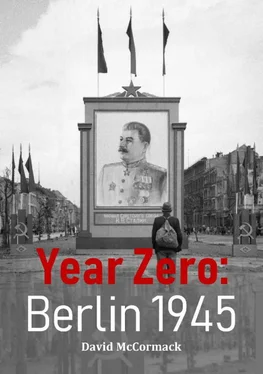In order to pass the time, Chuilov turned to more personal matters, by asking Krebs about his service in the army. The two then talked about the progress of the war, particularly Stalingrad, which both regarded as a turning point. It was only now that Krebs came to realise that he was sitting opposite the famous defender of Stalin’s city on the Volga.
The arrival of General Sokolovskii (Zhukov’s representative) marked a turning point in the negotiations. Speaking plainly, he reiterated the demand for unconditional surrender (which had in the meantime been confirmed by Moscow). Sokolovskii proposed that after the surrender of German forces in Berlin, the new government would be announced and provided with facilities to contact the western allies:
Sokolovskii: …You have Goebbels and others here, you can announce surrender.
Krebs: Only with the permission of Doenitz, and he is outside Berlin. We could send Bormann to Doenitz, as soon as we declare a pause. I have no aircraft nor radio…
Sokolovskii: Lay down your arms, then we will talk about the rest…
Krebs: If you will permit a pause, we can reach an agreement.
Sokolovskii: Only on the basis of surrender, after which Doenitz can come to us as you have done.
Krebs: Doenitz should be sent for…
Sokolovskii: I am not empowered to decide that. Surrender forthwith. Then we will arrange for Doenitz to make the trip here.
Krebs: …I cannot surrender without Doenitz. But I could ask Goebbels about this, if you will send my aide (Colonel von Dufving) to him.
Sokolovskii: So far we have reached the following: The German Colonel goes to Goebbels to find out whether he agrees to immediate surrender.
Krebs: Will there be an armistice, or must Goebbels agree to surrender before an armistice?
Sokolovskii: We will not permit any question of an armistice to be put to Goebbels.
Krebs: Without Doenitz neither I nor Goebbels can allow surrender.
Sokolovskii: Then you will not form your government.
Krebs: No, the government must be formed. Then decide the question of surrender.
As the talks had reached an impasse again, Sokolovskii contacted Zhukov for further instructions. The mantra was to remain the same, unconditional surrender. Meanwhile Krebs conferred with his aide. When Sokolovskii returned to the room following his talk with Zhukov, Krebs exclaimed, ‘The government of Germany must have authority’. Sokolovskii refused to acknowledge the legitimacy of any government sanctioned by Hitler. His response amounted to a reiteration of Moscow’s unalterable position. Realising this, Krebs reluctantly agreed to contact being initiated with Goebbels. With a heavy heart, he dispatched von Dufving to report on the substance of the negotiations.
Attempts to lay a telephone cable direct to Goebbels in the bunker were only partially successful. All contact was thus solely in the hands of von Dufving. After making a perilous journey from Chuikov’s command post to the German lines, von Dufving was briefly held by SS troops. Released on Bormann’s orders, he eventually made his way to the bunker in order to report to Goebbels. Predictably Goebbels rejected the Soviet proposals, saying, ‘I shall never, never agree to that’. He then ordered von Dufving to fetch Krebs back to the bunker. After having spent just over nine hours at Chuikov’s command post, Krebs returned to the bunker. At noon, every Soviet gun in the sector opened up on the remaining German bastion. Half of the first day of May had been wasted in fruitless discussions. Now the Soviet command in Berlin were determined to use their massive combat power to forcibly bring down the curtain on this epic drama.
General Weidling was in the bunker with Goebbels when Krebs made his report signalling the failure of his attempts to negotiate an armistice. He confirmed that the Soviet command in Berlin would accept nothing less than a complete surrender. Goebbels and Bormann baulked at the very notion of surrender, citing Hitler’s determination to continue the struggle. Exasperated beyond belief, Weidling exclaimed, ‘But the Fuhrer is dead!’. This cut no ice with Hitler’s loyal paladins. Weidling could only explain that prolonged resistance was no longer possible. Taking his leave from what he regarded as a madhouse, Weidling invited Krebs to accompany him back to his command post. Krebs politely refused, stating that he intended to commit suicide in the bunker.
With the final acceptance that the uncompromising stand made by the Soviet command in Berlin signalled the end of Nazism, Goebbels and his wife Magda prepared to take their exit from the world stage. The children would die too, as Magda Goebbels could see no future for them in a world deprived of Hitler’s genius. On 22 April, she arrived in the bunker with her six children, all of whom’s names began with the letter H, in honour of her idol. For Magda, just being in close proximity to Hitler was exhilarating. Following his capture, Colonel Kempka was asked about her relationship with Hitler. Responding in his typically earthy style, he said that, ‘Whenever she was in the presence of the Fuhrer, I could hear her ovaries rattling’. Indeed, her love for Hitler was so great that it blinded her to reality. It was in this state of intoxication that she murdered her children at approximately 18.00hrs by first giving them chocolate laced with Finodin to induce sleep, then crushing cyanide capsules between their teeth. The eldest child, twelve-year-old Helga, clearly put up a struggle, as when her lifeless body was discovered the following day, her face and neck showed signs of bruising.
After she had killed her children, Magda played solitaire, chain-smoking all the while. In the meantime, her husband reminisced with the Hitler Youth leader Artur Axmann about the early days of the struggle against the Communists in Berlin. At 20.15hrs, Goebbels informed the SS guards that both he and his wife intended to commit suicide in the New Chancellery courtyard. Carefully dressing for his last public appearance, Goebbels donned his kid gloves, hat, scarf and coat. He then took Magda’s arm, and together they made their way to the bunker entrance. The film Downfall shows Goebbels shooting his wife at close range. In reality, she bit on a cyanide capsule which acted quickly, leaving her in a kneeling position on the ground. Her husband then personally administered the coup de grace with a shot from his pistol into the back of her head. Goebbels himself made doubly sure of his own suicide by copying the method earlier employed by his master. However, the similarities ended here as there was precious little time left for formalities. Without ceremony, the bodies of Goebbels and his wife were hastily cremated in the open with the available petrol.
That evening, General Weidling gathered his staff together at his command post on the Bendlerstrasse. Recognising that Soviet advances in the city had rendered the possibility of a successful breakout too risky, the gathered officers agreed that there was no other course open to them other than surrender. At 00.40hrs, the Soviet 79 thGuards Division picked up the following transmission from Weidling’s 56 thPanzer Corps:
Hello, hello. This is the 56 thPanzer Corps. We ask you to cease fire. At 00.50hrs Berlin time we are sending envoys to parley at the Potsdamer Bridge. The recognition sign – white flag. We await reply.
The transmission was repeated five times over a one hour period until it was picked up. The message was acknowledged by 79 thGuards Division with the reply that the request for a cease fire had been forwarded up the chain of command. The end game had begun.
Meanwhile, an exhausted Chuikov received another German delegation, this time headed by Senior Executive Officer Heinersdorf of the Ministry of Propaganda. He came bearing a pink folder containing a letter from Dr Hans Fritzsche, who following the death of Goebbels and the disappearance of Bormann was now the most senior Nazi official left in Berlin. The letter stated:
Читать дальше












